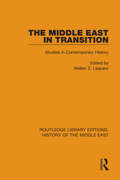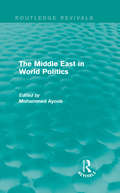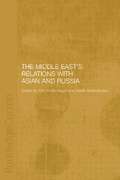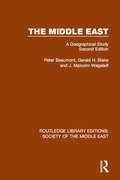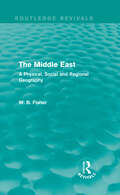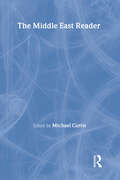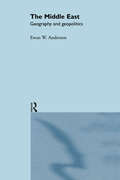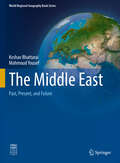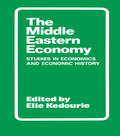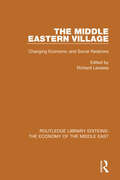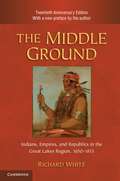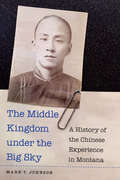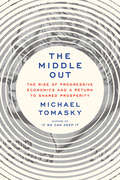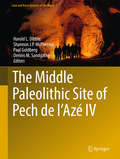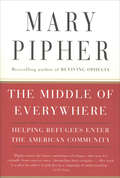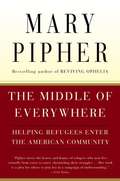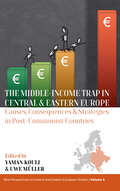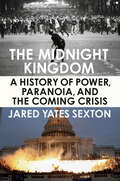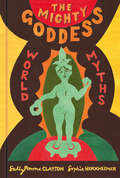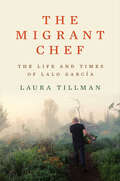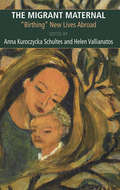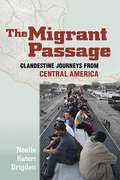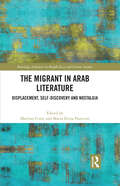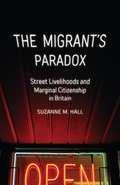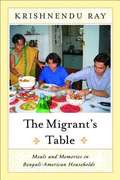- Table View
- List View
The Middle East in Transition: Studies in Contemporary History (Routledge Library Editions: History of the Middle East)
by Walter Z. LaqueurThis collection of essays, first published in 1958, presents analyses by some 34 specialists on key political and social trends in the Middle East. They take the reader through the history of the Middle East to help reveal the background behind the changes that took place in the middle of the twentieth century – a time of fundamental political, economic and social change in the region.
The Middle East in World Politics (Routledge Revivals)
by Mohammed AyoobThe Middle East is, and has always been, of major global economic and political importance. First published in 1981, this edited collection analyses many of the crucial issues that have had international repercussions during the second half of the twentieth century, with each paper considering the particular regional problems within the widest possible political framework. Internationally renowned authors consider such areas as the relationship between Israel and the Middle East, the influence of oil on global decision-making, Afghanistan and its neighbours, and the economic issues that the region has faced. A timely and relevant reissue, dealing with problems of continued importance, this volume will be of particular interest to students researching the history of the Middle Eastern conflict and the region’s variety of relationships with the West.
The Middle East's Relations with Asia and Russia (Durham Modern Middle East and Islamic World Series #Vol. 5)
by Anoushiravan Ehteshami Hannah CarterCarter and Ehteshami consider the significant geopolitical, economic and security links between the Middle East and the wider Asian world - links which are often overlooked when the Middle East is considered in isolation or in terms of its relations with the West, but which are of growing importance. Topics covered include Asia's overall geostrategic realities and the Middle East's place within them; relations between the Middle East and China, Russia, central Asia, southeast Asia and south Asia; Islam in central Asia and southeast Asia and the connections with the Middle East; and the important links between the Middle East and India and Pakistan's military and security establishments.
The Middle East: A Geographical Study, Second Edition (Routledge Library Editions: Society of the Middle East #13)
by Peter Beaumont Gerald Blake J. Malcolm WagstaffThis book, first published in 1976 and in this second edition in 1988, combines an examination of the political, cultural and economic geography of the Middle East with a detailed study of the region’s landscape features, natural resources, environmental conditions and ecological evolution. The Middle East, with its extremes of climate and terrain, has long fascinated those interested in the fine balance between man and his environment, and now its economic and political importance in world affairs has brought the region to the attention of everybody.
The Middle East: A Physical, Social and Regional Geography (Routledge Revivals)
by W. B. FisherIn this comprehensive study, first published in 1950, Professor Fisher examines all the principal elements – physical and human – that influence environment, development and ways of life in the Middle East. An analysis of the physical basis of the region is followed by detailed treatment of the complex human and social aspects; a concluding section brings together, on a regional basis, the elements discussed in the first two parts. With first-hand experience within the Middle East, Fisher presents a detailed and fascinating study, based on surveys and investigations he personally carried out. Including wide-ranging geographical, historical, sociological and political perspectives, this title provides essential background to anyone with an interest in Middle Eastern affairs.
The Middle East: A Reader
by Michael CurtisThe Middle East provides a thematic analysis of major forces and trends in contemporary Middle East and a thorough examination of individual countries in the region. This comprehensive anthology, the first in more than two decades, explores the political environment, religious and ethnic factors, economic factors, the Arab world, the Palestinians and the territories, Israel, the role of the superpowers, and the Middle East's relationship with the rest of the world. Every informed reader will want to consult The Middle East to understand this important and complex area of the world.Contents (partial): William L. Cleveland, "Sources of Arab Nationalism"; Carl Leiden, "Arab Nationalism Today"; Opoku Agyeman, "Pan-Africanism versus Pan-Arabism"; Elbani Hermassi, "The Maghrib and the Middle East Conflict"; Lenore G. Martin, "Boundary Disputes in the Persian Gulf"; Bernard Lewis, "The Return of Islam"; Daniel Pipes, "Understanding Islam in Politics"; Emanuel Gutmann, "Religion and Its Role in National Integration in Israel"; George Moutafakis, "Minorities in the Modern Middle East Societies"; Stuart E. Colie, "The Shiites and the Lebanese Tragedy"; Kenneth J. Arrow, "Energy"; Fred M. Gottheil, "Saudi Arabian Economic Power"; Eliyahu Kanovsky, "Arab Oil Power"; Victor T. Le Vine, "The Arab World in the 1980s"; Bernard Lewis, "Islamic Political Movements"; Raymond N. Habiby and Fariborz Ghavidel, "Khumayni's Islamic Republic"; James P. Jankowski, "Nationalism in Twentieth Century Egypt"; Sheikh R. Ali, "The Iran-Iraq War"; Raymond N. Habiby, "Quadhafi's New Islamic Scientific Socialist Society"; Moshe Aumann, "Land Ownership in Palestine"; Fred M. Gottheil, "Arab Immigration into Pre-State Israel"; Yehoshua Porat, "The Palestinian-Arab Nationalist Movement"; Yonah Alexander, "The Nature of the PLO"; Sammy Smooha and John E. Hofrnan, "Arab-Jewish Coexistence in Israel"; Michael Curtis, "The Evolution of Israeli Politics"; Aaron S. Klieman, "Zionist Diplomacy and Israeli Foreign Policy"; Jay Adams, "Assessing Israel as a 'Strategist Asset'"; Saul B. Cohen, "Jerusalem's Unity and West Bank Autonomy"; Meron Benvenisti, "Postive Thinking in Jerusalem"; Steven L. Spiegel, "Recent American Policy in the Middle East"; Alan Dowty, "U.S. Decision-Making in Middle East Crises"; Michael Curtis, "American Interest and the Middle East"; Aaron Wildavsky, "American's National Interest in Israel"; Adam M. Garfinkle, "U.S. Policy in the Near Term"; James R. Kurth, "U.S. Policy and the West Bank"; Alvin Z. Rubinstein, "The Soviet Union's Imperial Policy in the Middle East"; Michael Curtis, "Africa, Israel, and the Middle East"; Victor T. Le Vine, "The Arabs and Africa"; W. Howard Wriggins, "South Asia and the Gulf"; Roy Licklide, "Arab Oil and Japanese Foreign Policy"; Linda B. Miller, "Western Europe and the Middle East"; Dan V. Segre, "Israel and the Third World."
The Middle East: Geography and Geopolitics
by Ewan W. AndersonAlthough the focus is on geopolitics rather than regional geography, the aim of the book is to provide a reorientation, while maintaining an essential continuity with W. B. Fisher’s book of the same name, the seventh edition of which was published in 1978. A comprehensive account is provided of the physical and human geography of the region and, in this, certain sections from Fisher’s book have been retained. Based on the geography, a geopolitical assessment is then made of the states of the Middle East and of the major issues, such as water and conflict, which illustrate the interplay of geography and politics. With comprehensive illustrations, this is a lively and much-needed book, based upon a well-respected work, providing an excellent synopsis of the complexities that make the Middle East such an intriguing and important global region.
The Middle East: Past, Present, and Future (World Regional Geography Book Series)
by Keshav Bhattarai Mahmoud YousefThe Middle East and North Africa (MENA) region stands as a remarkable crossroads of tradition and modernity, shaped by millennia of history under empires, colonial powers, and global influences. This book unpacks the intricate dynamics of the region, examining how historical resource exploitation, border manipulation, and cultural impositions have profoundly impacted its languages, traditions, and geopolitical identity. The rich tapestry of Arabic, Farsi, Kurdish, and regional dialects reflects a deep cultural resilience that has resisted globalization, often fueled anti-Western sentiments and prioritized the preservation of heritage over rapid economic development. Central to the region’s geopolitical importance is its vast oil wealth, which has positioned MENA as a cornerstone of the global energy market and a continuous focus of Western interest. This book explores how oil exploitation has economically empowered the region while simultaneously fostering political tension, external interventions, and instability. As the global shift toward green technologies accelerates, the book examines how this transition might redefine MENA’s role in the global energy market, offering both challenges and opportunities for transformation. These dynamics unfold against the backdrop of water scarcity and a scorching, inhospitable climate that further complicates the region’s path forward. Grounded in real-life case studies and an interdisciplinary blend of historical, cultural, and economic analysis, this book offers an unparalleled exploration of the MENA region’s past, present, and future in the context of advanced technological development. Co-authored by a Palestinian native, it brings a unique perspective by dissecting ongoing identity crises through unbiased insights and true-life conversations with individuals who have embraced diverse religious and political ideologies. By intertwining these narratives with the region’s deeply rooted cultural practices, the book presents a compelling human lens to understand MENA's complexities. This rare and thought-provoking study seamlessly balances traditional and modern perspectives, emphasizing the MENA region’s pivotal role at the intersection of Western powers and the Global South. For readers seeking to grasp the intricate dynamics of a region that continues to influence and adapt to an ever-changing global order, this book serves as an indispensable resource.
The Middle Eastern Economy: Studies in Economics and Economic History
by Elie KedourieThis collection of essays covers economic issues of the Middle East during both the 19th and 20th centuries. The topics included in the book range from the economics of the export of Turkish labour to Western Europe to the economy of Central Asia and the study of coalminers in Eregli.
The Middle Eastern Village: Changing Economic and Social Relations (Routledge Library Editions: The Economy Of The Middle East Ser.)
by Richard LawlessRapid and uneven change to the fabric of rural life is widespread in modern Middle Eastern countries. Modernisation, usually in the Western model, has often brought major improvements in agricultural technology, education and public health but has also had the effect of weakening the traditional rural economy of many villages and encouraging their growing dependence on external sources of income, most notably oil remittances. This collection of research on the Middle Eastern village looks at the impact on rural life and environment of such factors as the mass exodus of labour to urban centres, emigration, immigration, environmental change and the changing role of women in rural communities – particularly the wives of migrant workers who have to fill a new role in the family structure. State-sponsored agrarian policies have weakened the power of traditional landed interests and together with labour migration have provoked new tension and inequalities in rural society. The book makes clear that the pattern of change has been highly uneven and has served to heterogenise the countryside. As the oil states enter a period of recession and the likelihood of substantial return migration increases, rural communities will need to make further major adjustments and the book examines the tensions this new development is likely to produce.First published in 1987.
The Middle Ground: Indians, Empires, and Republics in the Great Lakes Region, 1650-1815
by Richard WhiteAn acclaimed book and widely acknowledged classic, The Middle Ground steps outside the simple stories of Indian-white relations - stories of conquest and assimilation and stories of cultural persistence. It is, instead, about a search for accommodation and common meaning. It tells how Europeans and Indians met, regarding each other as alien, as other, as virtually nonhuman, and how between 1650 and 1815 they constructed a common, mutually comprehensible world in the region around the Great Lakes that the French called pays d'en haut. Here the older worlds of the Algonquians and of various Europeans overlapped, and their mixture created new systems of meaning and of exchange. Finally, the book tells of the breakdown of accommodation and common meanings and the re-creation of the Indians as alien and exotic. First published in 1991, the 20th anniversary edition includes a new preface by the author examining the impact and legacy of this study.
The Middle Kingdom under the Big Sky: A History of the Chinese Experience in Montana
by Mark T. Johnson2023 Caroline Bancroft History Prize from the Denver Public Library 2023 WHA W. Turrentine Jackson Award From the earliest days of non-Native settlement of Montana, when Chinese immigrants made up more than 10 percent of the territory&’s population, Chinese pioneers played a key role in the region&’s development. But this population, so crucial to Montana&’s history, remains underrepresented in historical accounts, and popular attention to the Chinese in Montana tends to focus on sensational elements—exoticizing Chinese Montanans and distancing their lived experiences from our modern understanding. The Middle Kingdom under the Big Sky seeks to recover the stories of Montana&’s Chinese population in their own words and deepen understanding of Chinese experiences in Montana by using a global lens. Mark T. Johnson has mined several large collections of primary documents left by Chinese pioneers, translated into English here for the first time. These collections, spanning the 1880s through the 1950s, provide insight into the pressures the Chinese community faced—from family members back in China and from non-Chinese Montanans—as economic and cultural disturbances complicated acceptance of Chinese residents in the state. Through their own voices Johnson reveals the agency of Chinese Montanans in the history of the American West and China.
The Middle Out: The Rise of Progressive Economics and a Return to Shared Prosperity
by Michael TomaskyPolitical journalist Michael Tomasky tracks an exciting change among progressive economists who are overturning decades of conservative dogma and offering an alternative version of capitalism that can serve broadly shared prosperity to all.In the first half of the twentieth century the Keynesian brand of economics, which saw government spending as a necessary spur to economic growth, prevailed. Then in the 1970s, conservatives fought back. Once they got people to believe a few simple ideas instead—that only the free market could produce growth, that taxes and regulation stifle growth—the battle was won. The era of conservative dogma, often called neoliberal economics, had begun. It ushered in increasing inequality, a shrinking middle class, and declining public investment. For fifty years, liberals have not been able to make a dent in it. Until now. In The Middle Out, journalist Michael Tomasky narrates this history and reports on the work of today's progressive economists, who are using mountains of historical evidence to contradict neoliberal claims. Their research reveals conservative dogma to be unfounded and shows how concentrated wealth has been built on the exploitation of women, minorities, and the politically powerless. Middle-out economics, in contrast, is the belief that prosperity comes from a thriving middle class, and therefore government plays a role in supporting families and communities. This version of capitalism--more just, more equal, and in which prosperity is shared--could be the American future.
The Middle Paleolithic Site of Pech de l'Azé IV
by Paul Goldberg Harold L. Dibble Dennis M. Sandgathe Shannon J. McPherronThis book provides comprehensive information on the materials excavated at Pech de l’Azé IV, both by the original excavator François Bordes in the 1970s, and more recently by the authors and their scientific team. Applying a range of new excavation and analytical techniques, it presents detailed material on the formation of the site, its chronology and the nature of the hominin occupations. Pech de l’Azé IV is part of a complex of Lower and Middle Paleolithic cave sites in the Dordogne Valley of southwestern France. Although this region is well known for its rich concentration of Paleolithic sites since the mid-19th century and many of the sites have been repeatedly excavated, no detailed studies have fully documented the stone tool technology and faunal remains or the changes in them over time. The site was regularly occupied by groups of Neanderthals from approximately 100,000 to 40,000 years ago, during which time global-scale changes transformed the region from a relatively warm climate (similar to today’s) to a very cold, glacial one. The site provides valuable insights into changes in Neanderthal behavior that reflect, at least in part, their adaptation to changes in the environment and the availability of important resources, such as prey species.
The Middle of Everywhere: Helping Refugees Enter the American Community
by Mary PipherThe bestselling author of Reviving Ophelia and Another Country profiles refugees from around the world who emigrate to the United States.In cities and towns all over the country, refugees arrive daily. Lost Boys from Sudan, survivors from Kosovo, families fleeing Afghanistan and Vietnam: they come with nothing but the desire to experience the American dream. Their endurance in the face of tragedy and their ability to hold on to the essential virtues of family, love, and joy are a tonic for Americans who are now facing crises at home. Their stories will make you laugh and weep—and give you a deeper understanding of the wider world in which we live.The Middle of Everywhere moves beyond the headlines, into the hearts and homes of refugees from around the world. Her stories bring to us the complexity of cultures we must come to understand in these times. &“Pipher enters the hearts and homes of refugees who now live virtually from coast to coast, chronicling their struggles…. Her work is a plea for others to join her in a campaign of understanding.&”—USA Today&“Pipher unites refugees, people who have fled some of the most oppressive regimes in the world, with all of us…. [She] is taking this moment to teach us un-American behaviors: Patience, manners, and tolerance.&”—Milwaukee Journal Sentinel&“Drawing upon anthropology, sociology and psychology, [Pipher] offers a deft, moving portrait of the complexity of American life…Pipher's ambitious undertaking of combining personal stories with global politics is wonderfully realized.&”—Publishers Weekly (starred review)
The Middle of Everywhere: The World's Refugees Come to Our Town
by Mary PipherLost Boys from Sudan, survivors from Kosovo, families fleeing Afghanistan and Vietnam: they come with nothing but the desire to experience the American dream.
The Middle-Income Trap in Central and Eastern Europe: Causes, Consequences and Strategies in Post-Communist Countries (New Perspectives on Central and Eastern European Studies #4)
by Yaman Kouli and Uwe MüllerSince the 1990s, the economic development of Central and Eastern Europe has maintained high economic growth rates, seemingly leading to an era of prosperity. This very positive vision of future economic success, linked to current political backlash and a long history of economic adversity, is a thin veil of the economic “way west” for so-called transition countries. The Middle-Income Trap in Central and Eastern Europe examines the reality of the diminishing marginal utility of further international investments alongside the pitfalls of higher government spending to cultivate innovation which ultimately makes foreign capital less attractive. In this volume authors from diverse disciplinary perspectives reflect on current debates surrounding the developmental bottlenecks in East-Central Europe. Their common goal is to analyze the manner of socio-economic transformation, question of the relevance and impact of the “middle-income trap” and identify possible ways to escape it.
The Midnight Kingdom: A History of Power, Paranoia, and the Coming Crisis
by Jared Yates SextonFrom the author of American Rule and the host of The Muckrake Podcast, an ambitious account of how white supremacist lies, religious mythologies, and poisonous conspiracy theories built the modern world and threaten to plunge us into an authoritarian nightmare. To fully understand these strange and dangerous times, Jared Yates Sexton takes a hard look at our nation&’s history: namely, the abuses committed by those in power and the comforting stories that shaped the way the West has viewed itself up to the present. As reactionaries and authoritarians cling to myths about &“Western civilization,&” The Midnight Kingdom exposes how political power, religious indoctrination, and economic dominance have been repeatedly weaponized to oppress and exploit, sounding an alarm for what lies ahead as the current order frays. Beginning with the Roman Empire and racing through centuries of colonization, war, genocide, and the recurring clashes of progress and regression, Sexton finds our modern world at a crossroads. In an echo of past crises, we have arrived at a time of historic inequality and a fading trust in our institutions. Meanwhile, authoritarianism is gaining momentum and the progress of the twentieth century is being rolled back at dizzying speed. This catastrophic moment holds terrible potential for a return to a totalitarian past or, potentially, a better, realer, more human future. The difference depends on a true reckoning with our history and the larger forces at play or hiding behind this disastrous fantasy of Western superiority. Bracing and compulsively readable, The Midnight Kingdom takes a critical look at the forces that have shaped human civilization for centuries—and invites us to seek a radically different future.
The Mighty Goddess: World Myths
by Sophie Herxheimer Sally Pomme ClaytonThe Goddess in all her glory! A celebration of important and powerful goddess mythologies from around the world. This stunning collection brings together goddess mythologies from across the globe: familiar, unknown, forgotten -- spectacular! Written by pioneering storyteller Sally Pomme Clayton, whose 30-year career has focused on researching female protagonists, these tales are conjured in vivid and poetic language. The book includes information about the pattern of myths and how they are represented globally and revels in the female, exploring desire, death, and the female body. Journey from Alaska to Mesopotamia and visit ancient Persian and Aztec cultures, meeting Sedna whose fingertips become sea creatures and Persephone whose sojourn in the Underworld brings Spring. This is the most significant contemporary collection of goddess myths and encourages readers to value the female, preserve culture and re-ignite storytelling traditions.
The Migrant Chef: The Life and Times of Lalo García
by Laura TillmanA chef’s gripping quest to reconcile his childhood experiences as a migrant farmworker with the rarefied world of fine dining. Born in rural Mexico, Eduardo “Lalo” García Guzmán and his family left for the United States when he was a child, picking fruits and vegetables on the migrant route from Florida to Michigan. He worked in Atlanta restaurants as a teenager before being convicted of a robbery, incarcerated, and eventually deported. Lalo landed in Mexico City as a new generation of chefs was questioning the hierarchies that had historically privileged European cuisine in elite spaces. At his acclaimed restaurant, Máximo Bistrot, he began to craft food that narrated his memories and hopes. Mexico City–based journalist Laura Tillman spent five years immersively reporting on Lalo’s story: from Máximo’s kitchen to the onion fields of Vidalia, Georgia, to Dubai’s first high-end Mexican restaurant, to Lalo’s hometown of San José de las Pilas. What emerges is a moving portrait of Lalo’s struggle to find authenticity in an industry built on the very inequalities that drove his family to leave their home, and of the artistic process as Lalo calls on the experiences of his life to create transcendent cuisine. The Migrant Chef offers an unforgettable window into a family’s border-eclipsing dreams, Mexico’s culinary heritage, and the making of a chef.
The Migrant Maternal: 'birthing' New Lives Abroad
by Schultes Anna KuroczyckaThis edited volume explores how and why immigrant/refugee mothers’ experiences differ due to the challenges posed by the migration process, but also what commonalities underline immigrant/refugee mothers’ lived experiences. This book will add to the field of women’s studies the much-needed discussion of how immigrant and refugee mothers’ lives are dependent on cultural, environmental and socio-economic circumstances. The collection offers multiple perspectives on migrant mothering by including ethnographic and theoretical submissions along with mothers’ personal narratives and literary analyses from diverse locales: New Zealand, Japan, Canada, The United States, Turkey, Italy and the Netherlands among others. The first section of the volume focuses on mothers’ roles in the family institution and the pressures and responsibilities they face in “creating” and “reproducing” families physically and socially. The second section shifts its attention to children and highlights mothers’ continued roles in the development of their children abroad, along with the gendered/generational dynamics in the settlement process and the resultant effects on motherhood responsibilities. In all chapters, readers will find how women negotiate their traditional roles in a new sociocultural milieu, and how mothering processes are critical in creating connections with traditions and homelands.
The Migrant Passage: Clandestine Journeys from Central America
by Noelle Kateri BrigdenAt the crossroads between international relations and anthropology, The Migrant Passage analyzes how people from El Salvador, Honduras, and Guatemala navigate the dangerous and uncertain clandestine journey across Mexico to the United States. However much advance planning they do, they survive the journey through improvisation. Central American migrants improvise upon social roles and physical objects, leveraging them for new purposes along the way. Over time, the accumulation of individual journeys has cut a path across the socioeconomic and political landscape of Mexico, generating a social and material infrastructure that guides future passages and complicates borders.Tracing the survival strategies of migrants during the journey to the North, The Migrant Passage shows how their mobility reshapes the social landscape of Mexico, and the book explores the implications for the future of sovereignty and the nation-state. To trace the continuous renewal of the transit corridor, Noelle Brigden draws upon over two years of in-depth, multi-sited ethnographic fieldwork along human smuggling routes from Central America across Mexico and into the United States. In so doing, she shows the value of disciplinary and methodological border crossing between international relations and anthropology, to understand the relationships between human security, international borders, and clandestine transnationalism.
The Migrant in Arab Literature: Displacement, Self-Discovery and Nostalgia (Routledge Advances in Middle East and Islamic Studies)
by Maria Elena Paniconi Martina CensiThis edited book offers a collection of fresh and critical essays that explore the representation of the migrant subject in modern and contemporary Arabic literature and discuss its role in shaping new forms of transcultural and transnational identities. The selection of essays in this volume offers a set of new insights on a cluster of tropes: self-discovery, alienation, nostalgia, transmission and translation of knowledge, sense of exile, reconfiguration of the relationship with the past and the identity, and the building of transnational identity. A coherent yet multi-faceted narrative of micro-stories and of transcultural and transnational Arab identities will emerge from the essays: the volume aims at reversing the traditional perspective according to which a migrant subject is a non-political actor. In contrast to many books about migration and literature, this one explores how the migrant subject becomes a specific literary trope, a catalyst of modern alienation, displacement, and uncertain identity, suggesting new forms of subjectification. Multiple representations of the migrant subject inform and perform the possibility of new post- national and transcultural individual and group identities and actively contribute to rewriting and decolonizing history.
The Migrant's Paradox: Street Livelihoods and Marginal Citizenship in Britain (Globalization and Community #31)
by Suzanne M. HallConnects global migration with urban marginalization, exploring how &“race&” maps onto place across the globe, state, and streetIn this richly observed account of migrant shopkeepers in five cities in the United Kingdom, Suzanne Hall examines the brutal contradictions of sovereignty and capitalism in the formation of street livelihoods in the urban margins. Hall locates The Migrant&’s Paradox on streets in the far-flung parts of de-industrialized peripheries, where jobs are hard to come by and the impacts of historic state underinvestment are deeply felt. Drawing on hundreds of in-person interviews on streets in Birmingham, Bristol, Leicester, London, and Manchester, Hall brings together histories of colonization with current forms of coloniality. Her six-year project spans the combined impacts of the 2008 financial crisis, austerity governance, punitive immigration laws and the Brexit Referendum, and processes of state-sanctioned regeneration. She incorporates the spaces of shops, conference halls, and planning offices to capture how official border talk overlaps with everyday formations of work and belonging on the street.Original and ambitious, Hall&’s work complicates understandings of migrants, demonstrating how migrant journeys and claims to space illuminate the relations between global displacement and urban emplacement. In articulating &“a citizenship of the edge&” as an adaptive and audacious mode of belonging, she shows how sovereignty and inequality are maintained and refuted.
The Migrant's Table: Meals and Memories in Bengali-American Households
by Krishnendu RayTo most of us the food that we associate with home—our national and familial homes—is an essential part of our cultural heritage. No matter how open we become to other cuisines, we regard home-cooking as an intrinsic part of who we are. In this book, Krishnendu Ray examines the changing food habits of Bengali immigrants to the United States as they deal with the tension between their nostalgia for home and their desire to escape from its confinements. As Ray says, This is a story about rice and water and the violations of geography by history. Focusing on mundane matters of immigrant life (for example, what to eat for breakfast in America), he connects food choices to issues of globalization and modernization. By showing how Bengali immigrants decide what defines their ethnic cuisine and differentiates it from American food, he reminds us that such boundaries are uncertain for all newcomers. By drawing on literary sources, family menus and recipes for traditional dishes, interviews with Bengali household members, and his own experience as an immigrant, Ray presents a vivid picture of immigrants grappling with the grave and immediate problem of defining themselves in their home away from home.
